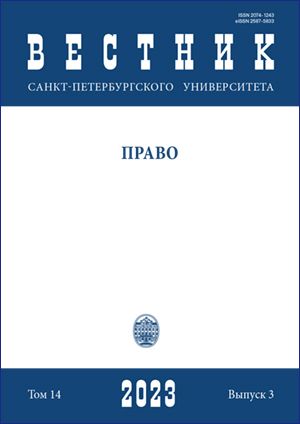Producer subsidies: Legal problems in the context of economic inhomogeneity
DOI:
https://doi.org/10.21638/spbu14.2023.302Abstract
Continuing to consistently maintain the public nature of relations on the provision of subsidies to producers of goods, works and services, the author turns to the identification of their economic essence. In this context, we note the legislator’s departure from the classical understanding of a subsidy, the transformation of the gratuitousness nature of subsidies and, in some cases, the obvious conventionality of the legislator’s reference to this instrument. Special attention in the article is paid to the study of economic heterogeneity of subsidies to cover the costs or loss of income of producers, the structure of which is analysed as independent types of subsidies for the reimbursement of relevant costs in the case of imperative involvement of producers in the implementation of public functions; incentive subsidies, and subsidies as an alternative to state (municipal) procurement. The legislator considers the peculiarities of the economic nature of the considered types of subsidies as a necessary prerequisite for ensuring proper legal certainty in the regulation of the relevant relations and increasing the level of guarantees for the protection of their participants. The research into the differences in the economic nature of the relations accompanied by the provision of subsidies to producers to cover costs or loss of income leads the author to the conclusion that there are basis both for the differentiation of approaches at the level of law to establish the legal framework of their public regulation, and for identifying the permissible limits of application of civil law to them. At the same time, the author believes that this does not preclude the universalization, within certain limits, of public rules on subsidies, primarily in terms of establishing basic guarantees of protection for the participants of the relevant relations.
Keywords:
producer subsidies, promoting subsidies, subsidies to income losses, repayment of subsidies, gratuitousness subsidies, public regulation of subsidies, an alternative to public procurement
Downloads
References
Downloads
Published
How to Cite
Issue
Section
License
Articles of "Vestnik of Saint Petersburg University. Law" are open access distributed under the terms of the License Agreement with Saint Petersburg State University, which permits to the authors unrestricted distribution and self-archiving free of charge.






